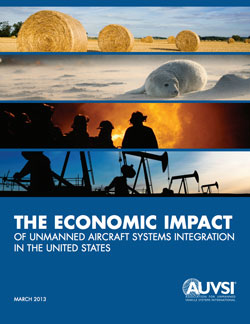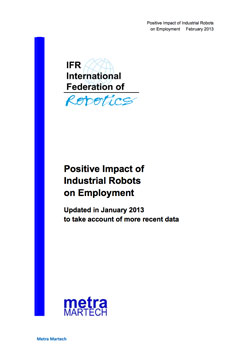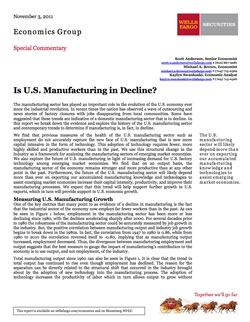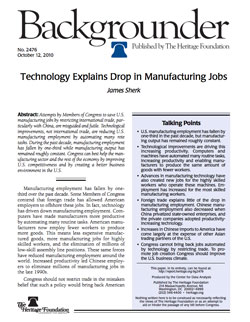
Robohub.org
Jobs by the numbers: Economic reports on the robotics and manufacturing industries
All the economics reports from a variety of stakeholders in one place! Don’t forget to bookmark this page – we will update it as new reports become available.
This post is part of Robohub’s Jobs Focus.
 Title
Title
Economic Impact of Unmanned Aircraft Systems Integration in the US
Released
March 2013
Authors
Darryl Jenkins, Dr. Bijan Vasigh
Published By
Association for Unmanned Vehicle Systems International (AUVSI)
Shows the economic benefit of UAS integration into the FAA regulation scheme. “AUVSI’s findings show that in the first three years of integration more than 70,000 jobs will be created in the United States with an economic impact of more than $13.6 billion. This benefit will grow through 2025 when we foresee more than 100,000 jobs created and economic impact of $82 billion.”
 Title
Title
Report on the Positive Impact of Industrial Robots on Employment
Released
February 2013
Authors
Peter Gorle, Andrew Clive
Produced By
Metra Martech
Commissioned By
International Federation of Robotics (IFR)
“The report´s authors studied companies with more than 250 employees in automotive sector, electronics sector, food and beverages, plastics, chemicals and pharmaceuticals. The Report focused on six countries, Brazil, China, Germany, Japan, Republic of Korea and USA, which are considered to be representative of the global economy. Findings show that one million industrial robots currently in operation have been directly responsible for the creation of close to three million jobs. A growth in robot use over the next five years will result in the creation of one million high quality jobs around the world.” See also the 2011 report.
 Title
Title
Manufacturing Executive’s The Multiplier Effect: There Are More Manufacturing-Related Jobs Than You Think
Released
March 2012
Authors
Keith D. Nosbuch, John A. Bernaden
Published By
Managing Executive Leadership Journal
“Smart manufacturing requires at least three to four times the number of indirect jobs for outside support compared with direct jobs—versus the much lower employment multiplier of traditional factories today, which is only about one-half of a non-manufacturing support job for every job in a factory. That’s because smart factories typically use more non-manufactured supplies, high-tech services, IT support, transportation, and logistics companies to accommodate their significantly increased productivity and higher output, often exported globally due to its cost-competitiveness.”
 Title
Title
Wells Fargo Securities Economics Group Special Commentary: Is US Manufacturing In Decline?
Released
November 2011
Authors
Scott Anderson, Michael A. Brown, Kaylyn Swankoski
Published By
WellsFargo Securities
“We find that previous measures of the health of the US manufacturing sector such as employment do not accurately capture the new face of US manufacturing that is now more capital intensive in the form of technology. This adoption of technology requires fewer, more highly skilled and productive workers than in the past. We use this structural change in the industry as a framework for analyzing the manufacturing sectors of emerging market economies. We also explore the future of US manufacturing in light of increasing demand for US factory technology among emerging market economies. We find that on an output basis, the manufacturing sector of the economy remains stronger and more productive than at any other point in the past. Furthermore, the future of the US manufacturing sector will likely depend more than ever on exporting our accumulated manufacturing knowledge and technologies to assist emerging market economies increase their capital intensity, productivity, and improve their manufacturing processes. We expect that this trend will help support further growth in US exports, which in turn will provide support to US economic growth.”
 Title
Title
Backgrounder: Technology Explains Drop in Manufacturing Jobs
Released
October 2010
Author
James Sherk
Produced By
The Center for Data Analysis
Published By
The Heritage Foundation
“Manufacturing employment has fallen by one third over the past decade. Some Members of Congress contend that foreign trade has allowed American employers to offshore these jobs. In fact, technology has driven down manufacturing employment. Computers have made manufacturers more productive by automating many routine tasks. American manufacturers now employ fewer workers to produce more goods. This means less expensive manufactured goods, more manufacturing jobs for highly skilled workers, and the elimination of millions of low-skill assembly line positions. These same forces have reduced manufacturing employment around the world. Increased productivity led Chinese employers to eliminate millions of manufacturing jobs in the late 1990s.”
See all the posts in Robohub’s Jobs Focus.
tags: ifr, Metra Martech, policy, roadmap for us robotics, RobohubFocus on Jobs, Statistics




